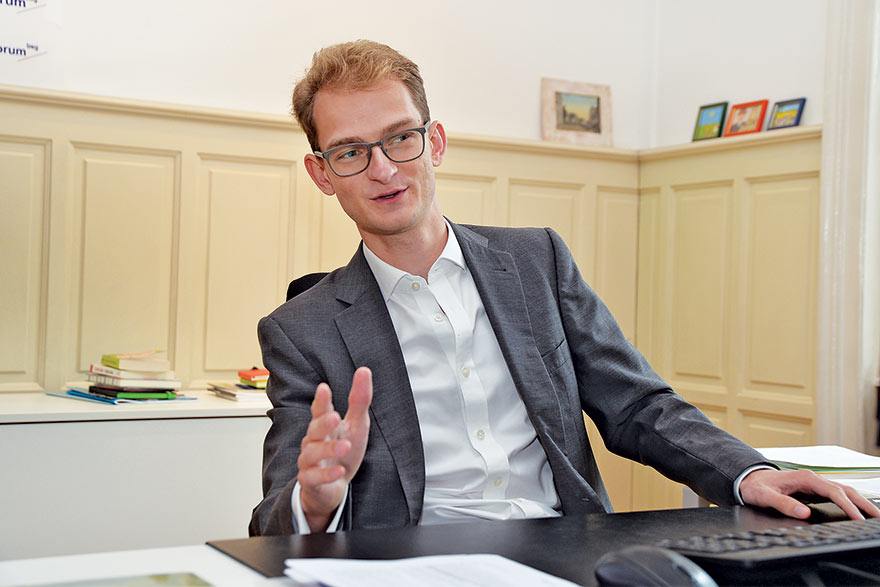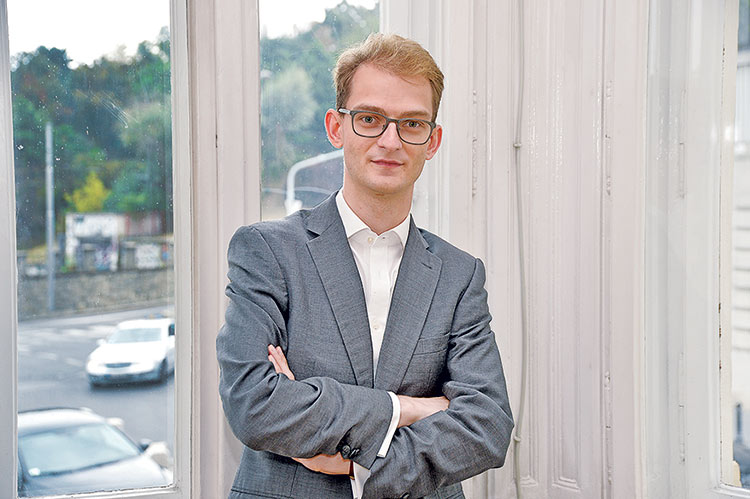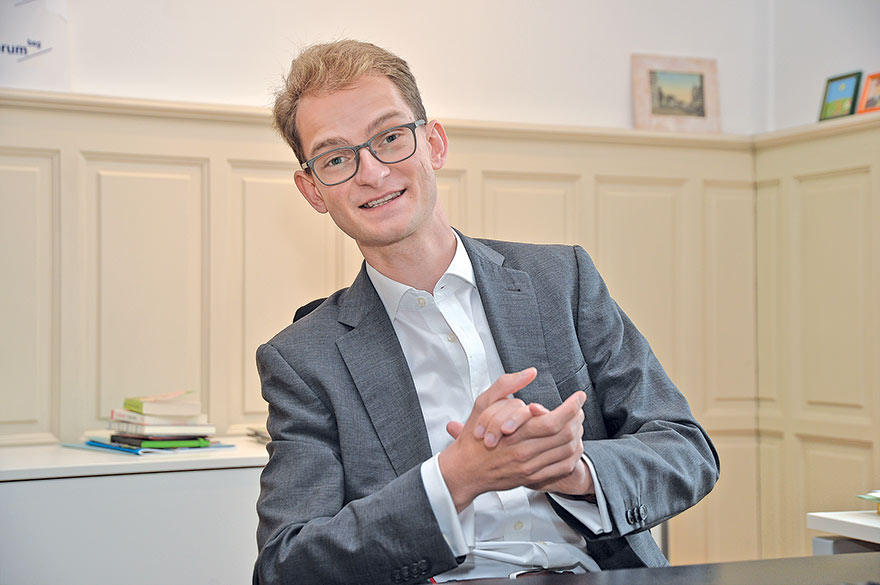The fact that the European capital of culture is a non-EU city is quite unique. As such, this is a great opportunityfor Novi Sad, and for Serbia, to present itself, but also for us to show our culture, values andconnections, and to show that European engagement in Serbia is real
There are two important anniversaries related to relations between Serbia and Austria this year: 185 years of diplomatic relations between the two countries; 20 years of the activities of the Austrian Cultural Forum (ACF) in Belgrade. This provided a good starting point for our conversation with ACF Belgrade Director Adrien Feix.
And we used this opportunity to discuss various topics: contemporary art, which remains in the focus of this institution around the world; environmental issues and Serbian responses; the importance of language to developing a genuine understanding of other cultures; the significance of tradition and the limitations it presents; new ACF projects, particularly those that will be implemented in Novi Sad during its tenure as the European Capital of Culture for 2022.
Considering this year’s anniversaries, how would you describe the current juncture, i.e., present relations between our two countries?
In the context of 185 years, it is always a very small frame that you can look at and work in. This long relationship has sometimes been good and sometimes worse, but has been very close most of the time. We, as the Austrian Embassy and as the Austrian Cultural forum, are now making sure that these enduring cultural relations stay alive and are constantly filled with new life, and not just to build them up on the basis of a strong tradition and famous names. If you ask me to characterise the present period, I would describe it as a period of great activity in Serbia and Austria.

We are facing new challenges in this strange time of COVID-19, but it has also brought us a lot of new creativity, new art forms, new ways to communicate art and engage with the public. Our goal is to constantly connect our two cultures under these circumstances.
You noted that cultural relations shouldn’t be limited by a strong tradition. The slogan of the ACF is also “izVan tradicije”, which is a play on words in Serbian – meaning simultaneously from and beyond tradition. So, how can these two be reconciled?
It is one of the usual contradictions that has to be reconciled – innovation and tradition. There is always a fine line between these two. Art, science and culture have to move along this line. They can neither fall into the recreating of tradition nor into something entirely disconnected from tradition, because they will lose the context and their connection to the more general population. So, you must be on the edge, and that is where we are trying to be, or at least what we are encouraging people to do. Our slogan is “izVan tradicije” because it covers the need for both, and it makes the exchange work.
We, as the Austrian Embassy and as the Austrian Cultural forum, are now making sure that these enduring cultural relations stay alive and are constantly filled with new life, and not just to build them up on the basis of a strong tradition and famous names. If you ask me to characterise the present period, I would describe it as a period of great activity in Serbia and Austria
With regard to this mission, what do you consider as being the most important and valuable work of the ACF over the previous two decades?
We are proud of the 20 years of the Austrian Cultural Forum in Belgrade, which is a comparatively short period when you look at the institutes of other countries that are here, but I think that we have a slightly different role. Our focus is almost exclusively on contemporary forms of creation, contemporary art, literature and film.
This represents a certain counterbalance to the traditional image of Austria around the world.
In which areas do you see room for improvement?
Besides the basics of our cultural work here, we try to venture into other fields. One of the issues is environmental sustainability, which is multifaceted and connects social, technological, scientific and political issues. It is different in each country.
In Serbia it has to do with air pollution, sustainable city planning, traffic etc. We are going into these areas. For example, we are supporting projects related to theatre and ecology, like the Dancing Trees project.

Another important topic for us is digital humanism, which is a sort of new buzzword, but which is actually essential for the future of civilisation. It encompasses all questions related to the power of technology, large companies and social networks; the issue of facial recognition, databases that can have your DNA and all kinds of personal characteristics… It deals with the issue of how to place humans at the centre of a world that is possibly going to be shaped by technologies, and how to understand and control that world.
What are your impressions when it comes to the political, social and cultural responses to issues of environmental sustainability in Serbia?
It is no secret that Serbia is facing a lot of challenges in the field of ecology. That is the first step. The question is what you do further with this insight. In general, countries that are in a similar situation always have a lot of trouble making real change, which is also noticeable in Serbia.
You must be on the edge, and that is where we are trying to be, or at least what we are encouraging people to do. Our slogan is “izVan tradicije” because it covers the need for both, and it makes the exchange work
Development in the field comes a bit later, after economic and social development, i.e., it is the second phase of development that follows huge confrontation, collisions of various interests etc. It is extremely difficult to make improvements if you lack a widespread consensus that something needs to be addressed.
Could you tell us more about current and future AFC projects?
On the occasion of 20 years of the ACF in Belgrade, we have a very big project called “At A Second Glance”, which started as an online platform where artists from Serbia and Austria could submit their works, video works, images and paintings on the topic of clichés and prejudices between our countries. We have decided to now switch the format to the real world. There is an exhibition and Austrian artists are coming to Serbia…
We had the Austrian Film Festival in October, which was the first edition after a long break.

Next year we will have another geographical focus – Novi Sad, the capital of culture. We will be very present there and our programme will be announced during November. There will be one major exhibition of feminist avant-garde at the Museum of Contemporary Art in Novi Sad. We will also have an exhibition on climate, aimed at enabling younger people to better grasp the issues of climate change.
Otherwise, we will have lots of concerts and a very intensive programme in September and October covering the fields of literature, music and theatre. The fact that the European capital of culture is a non-EU city is quite unique. As such, this is a great opportunity for Novi Sad, and for Serbia, to present itself, but also for us to show our culture, values and connections, and to show that European engagement in Serbia is real.
Finally, you have been learning the Serbian language for some time now. There are a lot of people in Serbia who are learning German, and that number is increasing. In your opinion, does knowing the language reveal some nuances that cannot otherwise be comprehended? And does it change the way you are accepted here?
Although language education is not our focus in Serbia, we engage here with the faculties of philology and philosophy, where German is taught. And we have a lot of projects, especially with the German language department in Belgrade. Students come here to do translation work with us; we have a competition in literary translation. We also have connections and projects with schools where German is taught.
I am convinced that knowing even a few words of someone’s language opens a new layer of communication. For me, knowing the language signifies the whole way of thinking and being. You cannot really understand a culture without knowing the language(s) there.
The assumption that you can bypass this by doing what we are doing now – speaking English – is a mistake. Lingua franca conveys certain messages, but it does not convey the subtexts and so many nuances. I think it is essential that lots of people here learn German and for us, as diplomats, to learn Serbian.
By Jelena Jorgačević